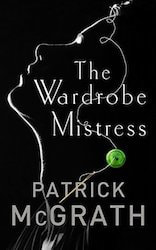
The Wardrobe Mistress is my fifth of the six novels shortlisted for The Walter Scott Prize for Historical Fiction. The winner is announced later this week, so I’m probably not going to get the sixth one read before the announcement, but I have it ready to go when I get a chance to read it.
This novel is set in 1947 London. While World War II is over, London is still suffering the rebuilding headaches and disruptions to services and available goods. The title character, Joan Grice, is the wardrobe mistress of a London theater company. Her husband Charlie is a well-known actor, currently playing Malvolio in Shakespeare’s Twelfth Night. Their daughter Vera is also an actress, just starting to become a star, and is married to a theater producer named Julius.
As the novel opens, Charlie has just died suddenly and the story opens with his funeral. When Joan is asked to attend a performance of Twelfth Night a short time after the funeral, she is struck by the uncanny feeling that Charlie’s understudy–or cover–is remarkably like the man he’s replaced. He has the same mannerisms, the same vocal inflections, the same performance as Charlie.
When Joan meets Frank, she’s convinced that she sees Charlie’s spirit still alive in the younger actor, so she befriends him, bringing him back to her home to measure him so she can alter some of Charlie’s suits to fit Frank. Over time, a romance begins between the two.
It seems like this is going to be a domestic drama about an awkward affair between Joan and Frank, especially when Vera finds out about it while working with Frank on a new production of The Duchess of Malfi. But halfway through the novel, Joan learns an outrageous secret about Charlie’s past that changes everything and pulls her into the heart of a political intrigue that is completely unexpected.
The second half of the novel is a little more disjointed than the first, as McGrath explores several new lines all at once. But overall, I was surprised at how much I enjoyed this book. Its reviews have not been universally positive, but for me, it was a good read. I don’t think it’s the kind of novel that will win the prize, but it may be the most enjoyable (for me) of the five I’ve read.
This novel is set in 1947 London. While World War II is over, London is still suffering the rebuilding headaches and disruptions to services and available goods. The title character, Joan Grice, is the wardrobe mistress of a London theater company. Her husband Charlie is a well-known actor, currently playing Malvolio in Shakespeare’s Twelfth Night. Their daughter Vera is also an actress, just starting to become a star, and is married to a theater producer named Julius.
As the novel opens, Charlie has just died suddenly and the story opens with his funeral. When Joan is asked to attend a performance of Twelfth Night a short time after the funeral, she is struck by the uncanny feeling that Charlie’s understudy–or cover–is remarkably like the man he’s replaced. He has the same mannerisms, the same vocal inflections, the same performance as Charlie.
When Joan meets Frank, she’s convinced that she sees Charlie’s spirit still alive in the younger actor, so she befriends him, bringing him back to her home to measure him so she can alter some of Charlie’s suits to fit Frank. Over time, a romance begins between the two.
It seems like this is going to be a domestic drama about an awkward affair between Joan and Frank, especially when Vera finds out about it while working with Frank on a new production of The Duchess of Malfi. But halfway through the novel, Joan learns an outrageous secret about Charlie’s past that changes everything and pulls her into the heart of a political intrigue that is completely unexpected.
The second half of the novel is a little more disjointed than the first, as McGrath explores several new lines all at once. But overall, I was surprised at how much I enjoyed this book. Its reviews have not been universally positive, but for me, it was a good read. I don’t think it’s the kind of novel that will win the prize, but it may be the most enjoyable (for me) of the five I’ve read.
 RSS Feed
RSS Feed
